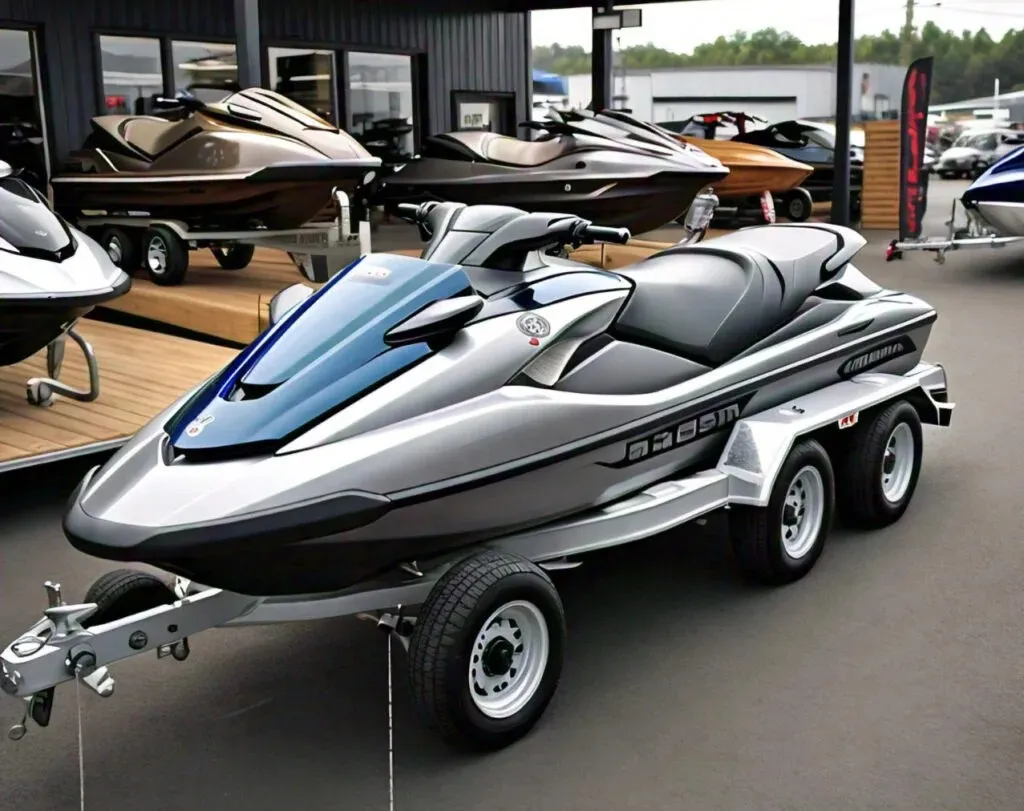
When it comes to enjoying your jet ski, having the right trailer is essential. A well-chosen trailer ensures easy and safe transportation of your jet ski to and from the water. In this guide, we’ll explore everything you need to know about jet ski trailers, from the different types available to maintenance tips and what to consider when purchasing one.
What is a Jet Ski Trailer?
A jet ski trailer is a specialized trailer designed to transport jet skis. These trailers are designed to securely hold jet skis in place, ensuring they remain stable during transport. Jet ski trailers come in different sizes and configurations to accommodate different types and sizes of jet skis.
Benefits of Using a Jet Ski Trailer
1. Easy transportation
A jet ski trailer makes it easy to transport your jet ski from home to the water. You can tow it behind your vehicle, allowing you to explore new places and enjoy your jet ski in different environments.
2. Secure storage
Using a trailer provides a secure storage solution for your watercraft when not in use. Keeps your jet ski off the ground, protecting it from damage and reducing the risk of theft.
3. Comfort
Having a trailer allows you to load and unload your jet ski quickly and easily, making spontaneous trips to the water more feasible and fun.
Types of Jet Ski Trailers
1. Single Jet Ski Trailers
Single jet ski trailers are designed to transport a jet ski. They are ideal for individual owners or those who only need to transport one jet ski at a time.
2. Jet ski double trailers
Double jet ski trailers can transport two jet skis simultaneously. They are perfect for families or groups who want to transport multiple jet skis together.
3. Jet ski trailers for various locations
Crew trailers are designed to transport more than two jet skis. They are typically used by rental companies or large groups that need to transport multiple jet skis at the same time.
How to Choose the Right Jet Ski Trailer
Consider height and weight
Make sure the trailer can accommodate the size and weight of your watercraft. Check the manufacturer’s specifications to confirm that the trailer capacity matches the dimensions and weight of your watercraft.
Quality of materials and construction
Jet ski trailers are made from different materials, including aluminum and galvanized steel. Aluminum trailers are lightweight and corrosion-resistant, while galvanized steel trailers are more sturdy and durable.
Ease of loading and unloading
Look for a trailer with features that make loading and unloading your watercraft easier. Rollers, winches, and adjustable bunks can help simplify the process.
Tow Vehicle Compatibility
Make sure your vehicle can safely tow the trailer and jet ski. Check your vehicle’s towing capacity and make sure it meets the requirements of your chosen trailer.
Additional Features
Consider additional features such as lights, tie-down points and storage compartments. These features can improve the functionality and convenience of your trailer.
Essential Maintenance Tips for Jet Ski Trailers
Periodic inspections
Inspect your trailer regularly for signs of wear. Check the tires, lights, and brake system to make sure everything is in good working order.
Keep clean
Rinse your trailer with fresh water after each use to remove salt, sand and debris. This helps prevent corrosion and keeps your trailer in good condition.
Lubricate moving parts
Lubricate your trailer’s moving parts, such as the winch and rollers, to ensure smooth operation and prevent rust.
check the tires
Periodically check tire pressure and tread depth. Properly inflated tires with good tread help ensure safe and efficient towing.
Secure connections
Before each trip, make sure all connections are secure. Check that the hitch, lights and tie-downs are properly secured and working.
How to Load and Unload Your Jet Ski
Recharge your jet ski
- Prepare the trailer: Place the trailer on a flat, stable surface. Make sure the bunks or rollers are adjusted to fit your watercraft.
- Back the vehicle: Slowly back your vehicle to align the trailer with the water. Make sure the trailer is submerged enough to allow the watercraft to float.
- Secure the jet ski: Use the winch to pull the jet ski to the trailer. Secure it with straps or ties to hold it in place.
Unloading your jet ski
- Attach the trailer: Return the trailer to the water until it is submerged enough for the watercraft to float.
- Release the straps: Carefully release the straps or ties securing the jet ski.
- Launch the Jet Ski: Use the winch to gently lower the jet ski into the water. Guide it off the trailer and into the water.
Conclusion
Choosing the right trailer for your jet ski is essential for safe and comfortable transportation. By considering factors such as size, material, and additional features, you will be able to find a trailer that meets your needs. Regular maintenance and proper loading and unloading techniques will ensure that your trailer and watercraft remain in excellent condition for many adventures to come.
FAQs
1. What type of trailer is best for a single jet ski?
A single jet ski trailer is ideal for individual jet ski owners. These trailers are designed to carry one jet ski securely and are typically lightweight and easy to maneuver.
2. Can I use a double jet ski trailer for one jet ski?
Yes, you can use a double jet ski trailer for one jet ski. However, ensure the jet ski is properly secured to prevent it from shifting during transport.
3. How often should I inspect my jet ski trailer?
Inspect your jet ski trailer before each use and perform a thorough inspection at least once a month. Regular inspections help identify and address any potential issues early.
4. What is the best material for a jet ski trailer?
Aluminum and galvanized steel are popular choices for jet ski trailers. Aluminum is lightweight and corrosion-resistant, while galvanized steel is durable and robust.
5. Do I need a special license to tow a jet ski trailer?
In most cases, a regular driver’s license is sufficient to tow a jet ski trailer. However, check your local regulations, as some areas may have specific requirements for towing trailers.
 The Boat Journey
The Boat Journey
Leave a Reply